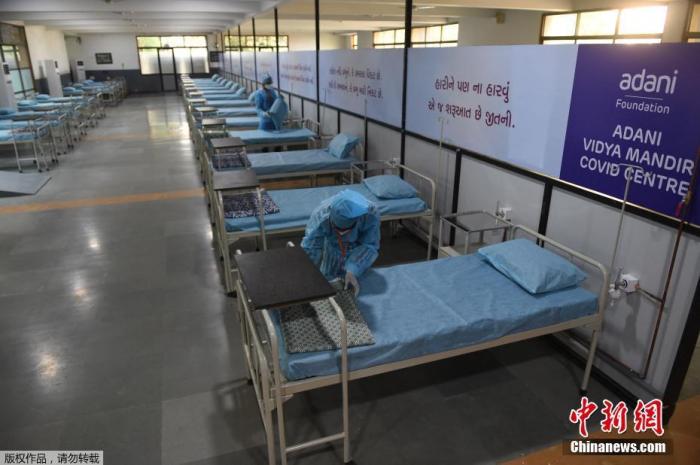Chinanews.com, May 30. India's new crown epidemic continues to raging, with a total of 27.55 million confirmed cases and more than 300,000 deaths. However, the vaccination progress has been slow, and many states and regions have insufficient vaccine stocks.
On the 28th, Bloomberg published a review article signed by Andy Mukherjee, entitled "Why India Should Buy Chinese Vaccines".
The article suggested that in order to get rid of the current predicament, India "must have a dialogue with China" and purchase Chinese vaccines.
The "Economic Times" of India reprinted the article and pointed out that "the way out for India under the vaccine crisis: call China".
May 6, 2021 local time, New Delhi, India. Medical staff take care of patients with new coronary pneumonia in the ICU ward of the Holy Family Hospital.
Image source: Visual China
At the beginning of the article, it was stated that India’s vaccine strategy had failed.
The contempt for the second raging epidemic and the false belief that local vaccines can supply 1 billion adults have thrown the entire country into chaos.
Although India is working hard to purchase supplies from Pfizer, Modena and Johnson & Johnson, these companies have already "exploded orders."
The author believes that “as long as the Indian authorities are more realistic, there will be a way out of the crisis.” The solution is to buy vaccines from China.
The article analyzes that at present, only 3% of India's population is fully vaccinated, so it is difficult for the country to achieve herd immunity.
However, if the Chinese vaccine is used, it can at least ensure that when the next wave of epidemic strikes, New Delhi will no longer cause thousands of deaths every day due to insufficient hospital beds or oxygen.
The article emphasizes that in order to achieve this goal, “India must have a dialogue with China.” But it also admits that “it’s easier said than done”.
On May 5, 2021 local time, the Adani Vidya Mandir School in the suburb of Ahmedabad, Gujarat, India, has been converted into a new crown care center, and the administrator is arranging beds.
For many politicians in India, it may be difficult to suddenly switch to advocating the use of Chinese vaccines.
However, what is now more important to the national interest than saving the Indians from avoidable death and reopening the economy for a long time?
The article pointed out that India hopes to increase the capacity of local vaccine manufacturers through the addition of Russian satellite-V vaccines, as well as other measures, to obtain the 2 billion vaccines it needs by the end of 2021.
However, the possibility of realization is very small.
Currently, less than 2 million Indians are vaccinated every day in India, which is 40% less than in April.
As a developing country with inadequate clinical care and little medical insurance, India should get as many people as possible to fully vaccinate as soon as possible.
The article mentioned that a study in Indonesia, another populous country, found that China's Kexing vaccine is more than 95% effective in preventing hospitalization and death of medical staff.
This should bring confidence to India.
The author of the article finally called, "(India) is now the time to take action." The article quoted the Wall Street Journal as saying that China's Sinopharm vaccine has been certified for emergency use by the World Health Organization, and the World Health Organization is still asking Kexing. The vaccine provides more data for emergency use certification assessments.

